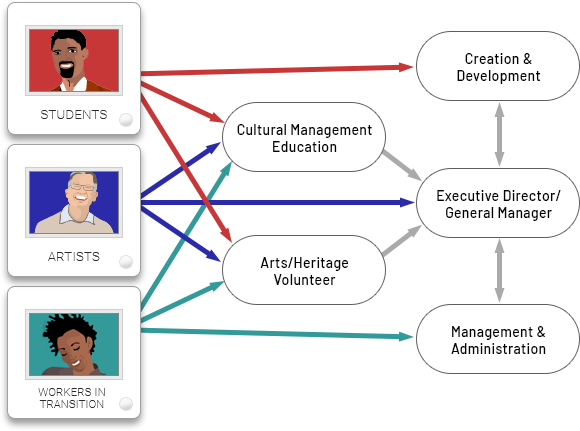| Cultural Managers | Work Search Strategies |
Cultural Management
Ways Into the Field
On this page:
- Many routes in
- How do I learn more skills?
- How do I get ahead?
- Who's who in cultural management education?
Many routes in
Paths into a career in cultural management are diverse and, for many, not a straight line. Common approaches include:
Ways Into the Field

Getting one's start in a cultural discipline
Many arts and heritage managers and administrators were artists or curators first, using creativity and passion In the practice of their discipline. Overtime, they have learned management and administrative skills through myriad Informal learning opportunities such as mentorship, networking, professional development at conferences, and on-the-job experience, often with a number of different organizations. They may have also taken formal courses in cultural management or administration.
Bringing management & administrative skills from other sectors and through volunteering
People also bring management and administrative skills from elsewhere, whether through paid work or as volunteers They are drawn into the cultural sector by desire to make a contribution to their communities, and to the creation, expression and preservation of arts and heritage. They learn about the discipline and the particular challenges of its practitioners through their work with artists and cultural organizations.
Studying cultural management at college or university
Some people move directly horn formal education Into the sector. They may have studied a cultural discipline, or completed specific programs in ads or heritage management and administration. They combine a passion fora discipline with their formal training, and move directly into junior level management or administrative jobs within the sector.
Learning transferable skills whenever possible
Ongoing professional development—through apprenticeship, internship, or-the-job training, mentorship, conferences and other professional networking opportunities — Ls essential to stay current in this rapidly changing environment. New skills also make it more possible that other opportunities for advancement will present themselves.
Taking advantage of unexpected opportunities
In addition, circumstances-and the courage to take advantage of opportunities that cross one's path-have led many people into challenging and ward rig careers In arts and heritage management You can get your start as a cultural manager in so many surprising ways. You might have been looking for work and the most interesting Job was In cultural management. Or you helped out a friend by selling tickets to a local amateur theatre performance or persuaded your favourite bar to give a gig to a new local act you'd heard ... and found you liked putting people and performances together. Or you were asked to sit on the Board of a community arts or heritage organization.
Moving from job to job within the sector
Regardless of how people enter the field, they are likely to move from position to position and from organization to organization during their career, gaining different kinds of experiences in each setting.
“I had the good fortune to enjoy a very active career nationally and internationally as a musician. In the summer of 1999, an injury ended my career as a performer and I was forced to redefine myself. My time at Concordia was most helpful in that it gave me the necessary tools to be a competent administrator. In 2002, McGill University offered me a position as a full-time professor and asked me to chair the strings department. The position led me to work closely with a number of cultural stakeholders and opened the door to new experiences. When I look back, I can see that an open mind, a varied career as an artist, and an ongoing interest in discovering new things were critical components of my career.”
André Roy, String Area Chair, Faculty of Music, McGill University
How do I learn more skills?
A quick scan of the testimonials sprinkled throughout this website illustrates some of the myriad ways to gain the knowledge and hone the skills required for a career in cultural management. There are many options related to education and training in cultural management. The routes can be grouped into four categories:
- Workshops offered at conferences or formal learning programs developed by many cultural organizations.
- Apprenticeship, internship, on-the-job training, and mentorship opportunities. Visit Culture Works Canada’s website for more information …
- Professional networking opportunities.
- Volunteering in the management or administration of cultural organizations, including on Boards.
“The arts are a community of highly dedicated and talented people from whom I have learned a great deal. Building a network of these people across the country and across disciplines has proven to be an invaluable support, both professionally and personally. This bulwark has allowed me to move freely – from granting programs, policy development, advocacy to the many other aspects of working in the arts – with assurance and a sense of camaraderie, accomplishment and personal fulfillment.”
Keith Kelly, Consultant, Ottawa
How do I get ahead?
Advancement into and within the cultural sector may follow a number of different routes:
- Moving into more responsible management positions in the same organization.
- Moving into a similar but more responsible position in another organization.
- Moving into an expanding part of the sector, such as within municipal government arts or heritage programming.
- Self-employment, by starting up a non-profit organization or a business, and then managing it.
- Independent consulting (for experienced, multi-talented and flexible people).
Routes Into a Cultural Management Career

“For me, a career in cultural administration has been a process of change and career-long learning. The variety of experiences and opportunities for continued personal challenge has been wonderful. Careers in the cultural sector require flexibility and ongoing professional development in the face of a broad range of skill requirements – the return is rewarding, meaningful work.”
Penny Houlden, Director, The Rooms, Provincial Museum of Newfoundland and Labrador
Who's who in cultural management education?
A number of colleges, universities and associations across Canada offer formal education programs – certificates, diplomas, undergraduate and graduate degrees – in cultural management. Many of the courses are quite different in level, length, delivery method and options, so it is worth investigating several alternatives. Some people go directly from high school into formal cultural management education and then into cultural management; others may have already completed a post-secondary degree or certificate and/or may have already worked as a cultural manager, and are now looking for a substantial professional development training program to build their competencies further.
Click on a link below to go directly to the website of a particular program and institution.
Algonquin College - Applied Museum Studies Program
www.algonquincollege.com/healthandcommunity/program/applied-museum-studies/
Banff Centre for Management - Leadership Development & Aboriginal Leadership and Management
www.banffcentre.ca/departments/leadership/
Bishop’s University - Arts Administration Option (Humanities)
www.gobishops.ca/bishops/program.do?from=subject&programID=39
Centennial College - Culture and Heritage Site Management
www.centennialcollege.ca/Programs/ProgramOverview.aspx?Program=1832
Concordia University - Graduate Diploma in Administration (Administration of Arts, Culture, Entertainment and Cultural Tourism Organizations)
johnmolson.concordia.ca/graduate-programs/graduate-diploma-administration
École des Hautes Études Commerciales
Grant MacEwan College - Arts & Cultural Management
www.macewan.ca/wcm/SchoolsFaculties/CFAC/Programs/ArtsCulturalManagement (includes online learning)
Humber College
www.humber.ca
Ryerson University - Continuing Education Publishing Program
www.ryerson.ca/ce/publishing
Simon Fraser University - Master of Publishing Program
www.ccsp.sfu.ca/home.html
Sir Sanford Fleming College - Museum Management and Curatorship
www.flemingc.on.ca/index.cfm/go/programs/sub/display/code/ACM/style/d.cfm
UBC Centre for Cultural Planning and Development
cstudies.ubc.ca/cultural-planning-and-development/index.html
University of Toronto - Museum Studies Program
www.ischool.utoronto.ca/programs-courses
University of Toronto at Scarborough - Co-operative Program in Arts Management
www.utsc.utoronto.ca/~coopam/
University of Victoria - Certificate in Cultural Sector Leadership or in Library Sector Leadership
publicadmin.uvic.ca/programs/graduate/graduateCertificates/graduateCertificates.php#section0-4
University of Victoria - Public Administration
web.uvic.ca/padm/mpa/index.htm
University of Waterloo, Centre for Cultural Management
ccm.uwaterloo.ca/
University of Western Ontario
www.uwo.ca/arts/
University of Windsor - Arts Management Certificate
web4.uwindsor.ca/arts/certificate
University of Winnipeg (continuing education) - Manitoba Arts & Cultural Management Certificate Program
www.creativemanitoba.ca/index.php?pid=54
York University, Schulich School of Business - M.B.A. Program in Arts and Media Management
www.schulich.yorku.ca/ssb-extra/mba.nsf/66e9924db987f1fa85256fc800610183/4363671f08b0e20d85256fc600683f64!OpenDocument
York University - Graduate Program in Art History
www.yorku.ca/ahistory
Another source of information about some of these programs is the website of the Canadian Association of Arts Administration Educators (CAAAE).